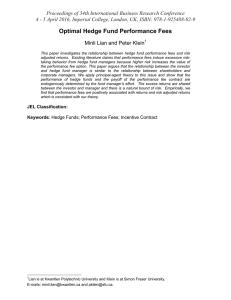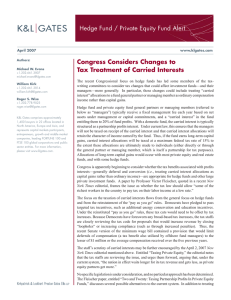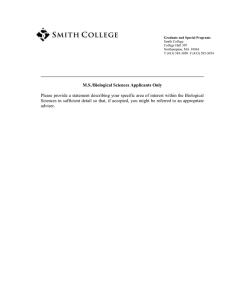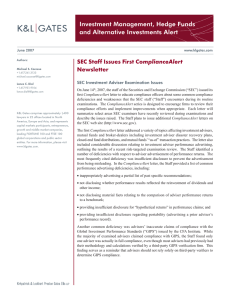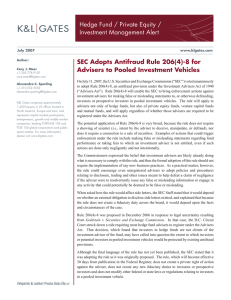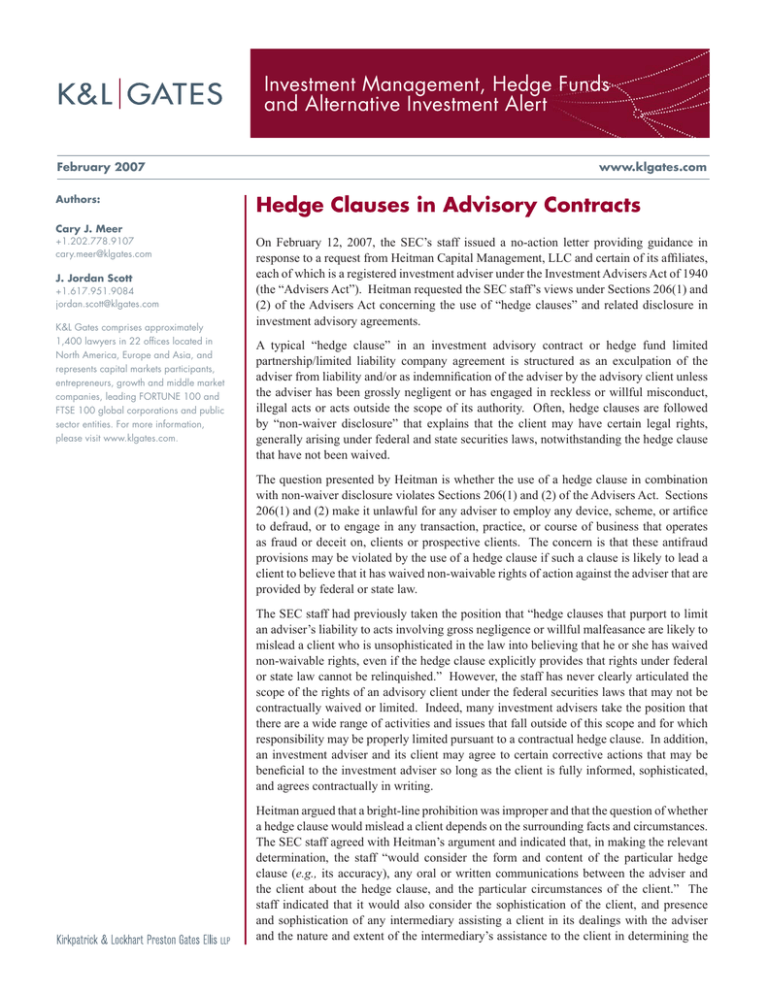
Investment Management, Hedge Funds
and Alternative Investment Alert
February 2007
Authors:
www.klgates.com
Hedge Clauses in Advisory Contracts
Cary J. Meer
+1.202.778.9107
cary.meer@klgates.com
J. Jordan Scott
+1.617.951.9084
jordan.scott@klgates.com
K&L Gates comprises approximately
1,400 lawyers in 22 offices located in
North America, Europe and Asia, and
represents capital markets participants,
entrepreneurs, growth and middle market
companies, leading FORTUNE 100 and
FTSE 100 global corporations and public
sector entities. For more information,
please visit www.klgates.com.
On February 12, 2007, the SEC’s staff issued a no-action letter providing guidance in
response to a request from Heitman Capital Management, LLC and certain of its affiliates,
each of which is a registered investment adviser under the Investment Advisers Act of 1940
(the “Advisers Act”). Heitman requested the SEC staff’s views under Sections 206(1) and
(2) of the Advisers Act concerning the use of “hedge clauses” and related disclosure in
investment advisory agreements.
A typical “hedge clause” in an investment advisory contract or hedge fund limited
partnership/limited liability company agreement is structured as an exculpation of the
adviser from liability and/or as indemnification of the adviser by the advisory client unless
the adviser has been grossly negligent or has engaged in reckless or willful misconduct,
illegal acts or acts outside the scope of its authority. Often, hedge clauses are followed
by “non-waiver disclosure” that explains that the client may have certain legal rights,
generally arising under federal and state securities laws, notwithstanding the hedge clause
that have not been waived.
The question presented by Heitman is whether the use of a hedge clause in combination
with non-waiver disclosure violates Sections 206(1) and (2) of the Advisers Act. Sections
206(1) and (2) make it unlawful for any adviser to employ any device, scheme, or artifice
to defraud, or to engage in any transaction, practice, or course of business that operates
as fraud or deceit on, clients or prospective clients. The concern is that these antifraud
provisions may be violated by the use of a hedge clause if such a clause is likely to lead a
client to believe that it has waived non-waivable rights of action against the adviser that are
provided by federal or state law.
The SEC staff had previously taken the position that “hedge clauses that purport to limit
an adviser’s liability to acts involving gross negligence or willful malfeasance are likely to
mislead a client who is unsophisticated in the law into believing that he or she has waived
non-waivable rights, even if the hedge clause explicitly provides that rights under federal
or state law cannot be relinquished.” However, the staff has never clearly articulated the
scope of the rights of an advisory client under the federal securities laws that may not be
contractually waived or limited. Indeed, many investment advisers take the position that
there are a wide range of activities and issues that fall outside of this scope and for which
responsibility may be properly limited pursuant to a contractual hedge clause. In addition,
an investment adviser and its client may agree to certain corrective actions that may be
beneficial to the investment adviser so long as the client is fully informed, sophisticated,
and agrees contractually in writing.
Heitman argued that a bright-line prohibition was improper and that the question of whether
a hedge clause would mislead a client depends on the surrounding facts and circumstances.
The SEC staff agreed with Heitman’s argument and indicated that, in making the relevant
determination, the staff “would consider the form and content of the particular hedge
clause (e.g., its accuracy), any oral or written communications between the adviser and
the client about the hedge clause, and the particular circumstances of the client.” The
staff indicated that it would also consider the sophistication of the client, and presence
and sophistication of any intermediary assisting a client in its dealings with the adviser
and the nature and extent of the intermediary’s assistance to the client in determining the
Investment Management, Hedge Funds
and Alternative Investments Alert
permissibility of a hedge clause. For unsophisticated
clients, the staff would consider numerous factors
including, but not limited to, whether: (i) the hedge
clause was written in plain English; (ii) the adviser
highlighted and explained the hedge clause during an
in-person meeting with the client; and (iii) the adviser
provided enhanced disclosure to explain the instances
in which such client may still have a right of action
against the adviser.
The staff noted that a hedge clause may be misleading
in its overall effect even if, when narrowly and
literally read, no single statement of material fact is
false. Furthermore, the staff stressed an adviser has
an affirmative duty to explain a hedge clause to its
client if the adviser believes or has reason to believe
that the client, in light of its unique circumstances,
would be likely to be misled by the clause.
206(1) and (2) of the Advisers Act. As a matter of
policy, the staff noted it will not provide no-action
or interpretive assurances under Sections 206(1) or
(2) regarding an adviser’s use of any particular
hedge clause.
Advisers may wish to review the standard of care and
indemnification language in their advisory agreements
and hedge fund operating documents, and consider the
level of sophistication of each of their clients and the
depth of the disclosure provided to them orally and
in the applicable disclosure documents regarding the
applicable standard of care. To the extent the client is
subject to ERISA, advisers should consider expanding
the “non-waiver clause” to clarify that the client is not
waiving any applicable rights under ERISA to the
extent that the adviser would otherwise be exculpated/
indemnified for a breach of fiduciary duty.
In sum, the staff indicated that the use of a hedge
clause, accompanied by non-waiver disclosure of the
type described above, would not per se violate Sections
K&L Gates comprises multiple affiliated partnerships: a limited liability partnership with the full name Kirkpatrick & Lockhart Preston Gates
Ellis LLP qualified in Delaware and maintaining offices throughout the U.S., in Berlin, and in Beijing (Kirkpatrick & Lockhart Preston Gates Ellis
LLP Beijing Representative Office); a limited liability partnership (also named Kirkpatrick & Lockhart Preston Gates Ellis LLP) incorporated in
England and maintaining our London office; a Taiwan general partnership (Kirkpatrick & Lockhart Preston Gates Ellis) which practices from
our Taipei office; and a Hong Kong general partnership (Kirkpatrick & Lockhart Preston Gates Ellis, Solicitors) which practices from our Hong
Kong office. K&L Gates maintains appropriate registrations in the jurisdictions in which its offices are located. A list of the partners in each
entity is available for inspection at any K&L Gates office.
This publication/newsletter is for informational purposes and does not contain or convey legal advice. The information herein should not be
used or relied upon in regard to any particular facts or circumstances without first consulting a lawyer.
Data Protection Act 1998—We may contact you from time to time with information on Kirkpatrick & Lockhart Preston Gates Ellis LLP seminars
and with our regular newsletters, which may be of interest to you. We will not provide your details to any third parties. Please
e-mail london@klgates.com if you would prefer not to receive this information.
©1996-2007 Kirkpatrick & Lockhart Preston Gates Ellis LLP. All Rights Reserved.
February 2007 | 2


